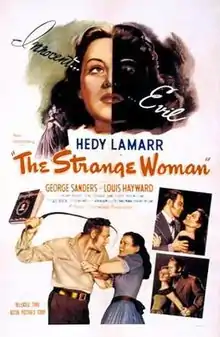The Strange Woman
The Strange Woman is a 1946 American drama film noir thriller film directed by Edgar G. Ulmer and written by Ulmer and Hunt Stromberg, starring Hedy Lamarr, George Sanders and Louis Hayward. Originally released by United Artists, the film is now in the public domain.
| The Strange Woman | |
|---|---|
 Theatrical release poster | |
| Directed by | Edgar G. Ulmer |
| Produced by | |
| Written by | |
| Screenplay by | Herb Meadow |
| Based on | The Strange Woman 1941 novel by Ben Ames Williams |
| Starring | |
| Music by | Carmen Dragon |
| Cinematography | Lucien N. Andriot |
| Edited by |
|
Production company | Hunt Stromberg Productions Mars Film Corporation |
| Distributed by | United Artists |
Release date |
|
Running time | 100 minutes |
| Country | United States |
| Language | English |
| Box office | $2.8 million (US rentals)[1] |
Plot
In Bangor, Maine in 1824, a cruel young girl named Jenny Hager pushes a terrified Ephraim Poster into a river knowing he cannot swim. She is prepared to let him drown until Judge Saladine (Alan Napier) happens by, at which point Jenny jumps into the water and takes credit for saving the boy's life.
About ten years later, Jenny (Hedy Lamarr) has grown up to be a beautiful but equally heartless and manipulative young woman. Her father, an abusive, drunken widower, whips Jenny after learning of her flirtation with a sailor. She secretly schemes to wed the richest man in town, the much older timber baron Isaiah Poster (Gene Lockhart), while his mild-mannered son Ephraim (Louis Hayward) is away at college in Cambridge, Massachusetts.
Isaiah is unkind to Ephraim upon Ephraim's return. He is unaware that the boy and Jenny (now Isaiah's wife) were once sweethearts and that Jenny is again flirting with Ephraim behind his back. Isaiah is more concerned about the lawlessness in town, lumberjacks drunkenly pillaging the town, manhandling the women and killing the judge, confirming Isaiah's long-held belief that Bangor must organize a police force.
Jenny secretly hopes that her husband will die after he falls ill. When he recovers, Isaiah must make a trip to his lumber camps. Jenny appeals to Ephraim to arrange his father's death, saying, "I want you to return alone." In the rapids, both men fall from an overturned canoe and Isaiah drowns. His son, still deathly afraid of water, is unable or unwilling to save him.
To his shock, Ephraim returns to Jenny telling him, "You can't come into this house, you wretched coward...You've killed your father." He becomes a hopeless drunk, hating her and speaking freely about her deceitful ways. Isaiah's superintendent in the timber business, John Evered (George Sanders), goes to confront Ephraim but isn't sure whether to believe the harsh words he hears about Jenny.
Jenny proceeds to seduce Evered, who is engaged to marry her best friend, Meg Saladine (Hillary Brooke), the judge's daughter. Lust overtakes them during a thunderstorm. After their wedding, Evered is eager to have children, but Jenny learns she cannot bear any. She confesses this to her new husband after some delay, fearful of his rejection of her, but to Jenny's relief, Evered wholeheartedly affirms his love.
A traveling evangelist, Lincoln Pettridge (Edward Biby), preaches fire and brimstone that results in Jenny's searing confession to her husband that all Ephraim had said about her was true. Evered goes off to be by himself at a lumber camp, and Jenny learns that Meg has gone to see Evered there. In the cabin, knowing of his love for Jenny, Meg tells him to go back to his wife. Jenny pulls up to the cabin right afterward and, seeing them together frantically whips her horse, bearing down on them with her carriage. It hits a rock, careens off a cliff and Jenny is mortally wounded. Her dying words are an expression of her passionate feelings for Evered, who has let her know true love.
Cast
_1.jpg.webp)
- Hedy Lamarr as Jenny Hager
- George Sanders as John Evered
- Louis Hayward as Ephraim Poster
- Gene Lockhart as Isaiah Poster
- Hillary Brooke as Meg Saladine
- Rhys Williams as Deacon Adams
- June Storey as Lena Tempest
- Moroni Olsen as Rev. Thatcher
- Olive Blakeney as Mrs. Hollis
- Kathleen Lockhart as Mrs. Partridge
- Alan Napier as Judge Henry Saladine
- Dennis Hoey as Tim Hager
Production
The production dates were from December 10, 1945 to mid-March 1946 at the Samuel Goldwyn Studios. Hedy Lamarr and Jack Chertok formed a partnership to produce this film. Production on the film was shut down between December 13, 1945 and January 3, 1946 due to Hedy Lamarr's bout with the flu. The film's sets were designed by the art director Nicolai Remisoff.
The film went over budget by $1 million but was a moderate success at the box office.[2]
See also
References
- "Top Grossers of 1947", Variety, 7 January 1948 p 63
- Balio, Tino (2009). United Artists: The Company Built by the Stars. University of Wisconsin Press. ISBN 978-0-299-23004-3. p203
External links
| Wikimedia Commons has media related to The Strange Woman. |
| Wikiquote has quotations related to: The Strange Woman |
- The Strange Woman at IMDb
- The Strange Woman at AllMovie
- The Strange Woman at the TCM Movie Database
- The Strange Woman at the American Film Institute Catalog
- The Strange Woman is available for free download at the Internet Archive
- The Strange Woman film scene on YouTube